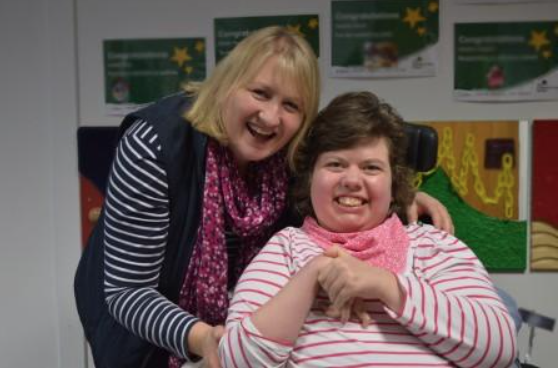
The Children’s Trust have recently signed up to support the Changing Places campaign. Sharon, Mum to Elinor who is supported by The Children's Trust, explains why changing places toilets are so important.
My daughter Elinor is 23 years old and has severe physical and learning disabilities affecting all areas of her development. Elinor lives at home and currently accesses a day college at The Children’s Trust, Monday to Friday, and respite in a care home.

Elinor is fully dependent on a carer and a wheelchair for getting around. She is also totally dependent on hoisting for all moving and handling as she cannot weight bear or move independently. Due to a spinal fusion operation back in 2009 she is now confined to a specially moulded chair as she is unable to sit independently. Despite her severe learning disability, she has been using a toilet since the age of three, which makes fully accessible toilets absolutely essential.
We are desperately trying to keep Elinor at home for as long as we can as she is valued member of our family. But the problems we face are that her disabilities restrict us so much and prevent us from taking part in things that ‘normal’ families do together. Things like going out for the day and going on holidays together. This is because buildings and pavements can be quite a challenge, but finding accessible toilet facilities in the community is almost impossible.
When Elinor was younger and smaller she was fully included in all family activities as we were able to access public toilets by us lifting her out of her chair. By the age of 12 she had lost her weight bearing skills and became too heavy leaving us unable to go out on long days as we needed to be within reach of her own toilet. Elinor naturally becomes very distressed if she cannot access a toilet when needed.
We are immensely proud of Elinor’s toilet achievement but it saddens us to think that this very skill is now restricting her from taking part in community life. We ‘manage’ by booking respite care for activities which cannot include Elinor. However life cannot always be planned.
It is astonishing that many newly constructed buildings have not been designed with adequate thought for facilities, especially if these needs mean someone requires hoisting.
Often, it’s thought that a ramp and lowered sink is all that is needed. Being involved with the physically disabled world I am often shown beautifully decorated large toilet rooms with widened doorways and a toilet that is positioned right into a corner so that a disabled person needing 2 carers is unable to be assisted.
Elinor is due to leave college this Summer. So far we have been unable to find a provider that can fully facilitate her needs as there is such a shortage of places.
It is shameful that many buildings in Surrey currently designated for the severely physically disabled, such as colleges, day centres and schools, do not have facilities that can meet their needs. My own daughter was unable to access a 2 local colleges for profound disabled students because the toilet with hoist facility was situated on an upper floor and wheelchair users were only able to access ground floor facilities which had a small cubicle toilet next to a large room with a changing bed and hoist. Another college had very large changing rooms where all the hoists stopped 0 .5 meters short of the toilet!
In times of financial crisis pressing local councils to finance community facilities is very difficult especially when it involves smaller demographic groups. However, there is a desperate need for adequate facilities in our towns and community buildings so that everybody has a chance to lead a fully inclusive life.



 FAQ
FAQ
 Share
Share